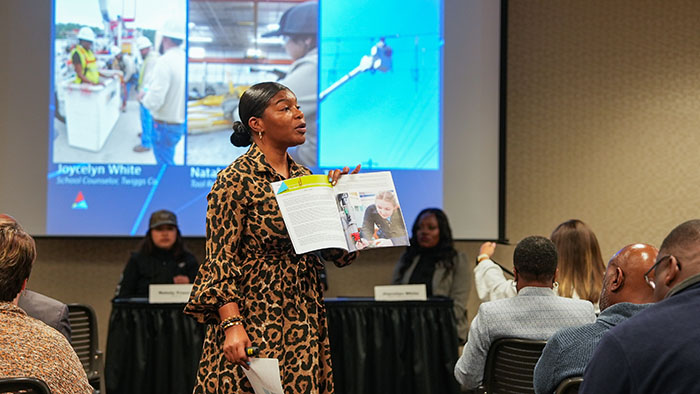
Writer: Margaret Blanchard
Addressing workforce development is a team sport, and the University of Georgia’s Carl Vinson Institute of Government is leading the way by convening stakeholders, sharing best practices and unpacking the latest data for industries across Georgia.
More than 300 participants recently gathered at the third annual Innovating Georgia’s Workforce Pipeline conference in Athens to network and learn about talent development needs and building long-term workforce pipelines. The conference has grown over time, with nearly 1,000 professionals participating since its launch. It is an initiative of the UGA Institute of Government’s Georgia Workforce and Economic Resilience Center, a hub of programs and services designed to support continued economic and workforce competitiveness.
“The UGA Institute of Government is committed to addressing the state’s specific workforce needs. We are uniquely qualified to bring together stakeholders to share proven strategies and innovative ideas for building better communities every day,” said Rob Gordon, director.
Institute of Government faculty member Rebecca Hunt presented the latest Georgia Workforce Pipeline Snapshot, a data-driven annual report on the economy, labor force and education. One key takeaway was that while most working age Georgians (77%) have a job, long-term demographic shifts will impact future workforce availability.
The conference also marked the launch of Engaging the Future Workforce: A Guide for Georgia Businesses. Developed in partnership between the Institute of Government and Georgia Power, the toolkit focuses on proactive steps employers can take to invest locally in the workforce.
“We’ve gone from conversation to action. The last couple of years have galvanized the effort, and the guide provides tangible steps that give people a starting point,” said Joseph Lillyblad, education and workforce development manager at Georgia Power, an event sponsor.
Collaboration was a top theme running through the conference. Presenters representing governmental agencies, education and industry shared experiences of successful programs engaging youth, the formerly incarcerated and military veterans.
“Communities and companies have gotten creative with their approach, and we are excited to share their forward-thinking,” said Greg Wilson, assistant director at the Institute of Government.
Programs like FLEX (Foundational Leadership and Entrepreneurship Experience) in Fitzgerald engage high school students in the business world through experiences, mentoring and competition. Students in the competition have gone on to form successful companies.
But the competition is just the “carrot on the end of the stick,” explained Melissa Dark, executive director of FLEX and president/CEO of the Fitzgerald-Ben Hill County Chamber of Commerce.
“The magic really happens with participation—it gets kids more excited because of ownership and puts the onus on them to understand the big picture of work,” she said.
Since its inception three years ago, FLEX has expanded to nine communities and is becoming a vital resource for tapping into talent in rural communications.
Amy Hutchins of TeamTri, which is partnering with the Department of Education on organizational effectiveness, appreciated the conference’s focus on youth workforce development.
“I love the sharing of best practices around engaging students. Taking a skills-based approach and giving them clear pathways to be successful is very encouraging,” she said.
Conference attendees also praised the event’s networking opportunities.
“The beauty of this conference is not only the workshops and the plenary sessions, but more importantly, it’s the people who come here from all over the state and the connections we make. We all have to work together,” said Marvin Nunnally, director of economic development at Athens Technical College.
Conference sponsors included Georgia Power, Amazon, Georgia Realtors, Kia, Shaw Industries and Worksource Georgia. Also providing support were Atlanta Gas Light, Atlanta Electrical Contractors Association, Electric Cities of Georgia, Goodwill of North Georgia, Jackson EMC, and MAU Workforce Solutions.
For more information about workforce-related events, visit here.
Picture above: Nikia M. Johnson, Workforce Development Specialist at Georgia Power, discusses the new "Engaging the Future Workforce: A Guide for Georgia Business" document during the "From Exploration and Exposure to Experience" breakout session.
|
|
|
|
|
|
Engaging the Future Workforce: A Guide for Georgia Businesses This document was designed to provide businesses with an easy-to-follow guide of how to undertake key workforce development engagement strategies. |
|
|
|
|
|
|
|
|
|
|
|
Save the Date The 2024 Innovating Georgia’s Workforce Pipeline Conference will be held Nov. 12-13, 2024, in Athens. Registration will open in July. |
|
|
|
|
|